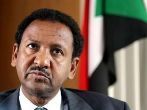Sudanese FM: Darfur crisis ‘tribal conflict,’ not genocide
By CHAKA FERGUSON, Associated Press Writer
NEW YORK, Oct 1, 2004 (AP) — Sudan’s foreign minister on Thursday dismissed claims by the United Nations that his country’s Darfur region is experiencing the world’s worst humanitarian crisis, saying instead atrocities committed there were caused by “tribal conflict.”
 Foreign Minister Mustafa Osman Ismail also said fighting between government-backed militias and non-Arab African rebel groups that has displaced 1.4 million villagers from their homes was not ethnic cleansing. More than 50,000 people have died in the conflict, which began last year.
Foreign Minister Mustafa Osman Ismail also said fighting between government-backed militias and non-Arab African rebel groups that has displaced 1.4 million villagers from their homes was not ethnic cleansing. More than 50,000 people have died in the conflict, which began last year.
“The position of our government is that this is not genocide,” Ismail said during a discussion at the Council on Foreign Relations. “It is a tribal conflict.”
Ismail said he supported a U.N. Security Council resolution that called for the creation of an international commission to investigate claims of genocide in Darfur. The council also threatened sanctions against Sudan if it doesn’t act to restrain Arab militias.
The foreign minister acknowledged there were problems in the region, but he said some reports had been exaggerated.
“There is no famine in Darfur,” he said. “There is no epidemic (of disease) in Darfur … (but) I’m not saying it is normal.”
Sudan’s Arab-dominated government is accused of mobilizing Arab tribal fighters for air raid-backed attacks on Darfur’s non-Arab villagers in retaliation for uprisings launched by two non-Arab Darfur rebel movements in 2003.
It also is accused of trying to put down the rebellion by using armed Arab herdsmen known as Janjaweed, who long have competed with villagers over Darfur’s scarce resources.
Ismail blamed rebels for the violence, however, saying they attacked tribes that would not join their cause. He said the government has begun to crack down on the Janjaweed, whom he described as “bandits,” but he said not all the militias were Janjaweed.
Darfur, which is about the size of France, is a diverse region in western Sudan with more than 80 tribes. Sometimes there are conflicts among the tribes that don’t involve the government, Ismail said. “You can imagine how the situation is complicated,” he said.
The Sudanese government would welcome an expanded peacekeeping force from the African Union to monitor the situation and increased political talks to resolve the crisis, Ismail said.
The African Union has about 80 military observers in Darfur protected by 300 soldiers.
The Darfur crisis comes as Sudan, which has a population of 39 million, moves closer to an internationally brokered peace agreement in a 21-year civil war that broadly pits the Muslim north against the Christian and animist south. More than 2 million people have died in that war.
